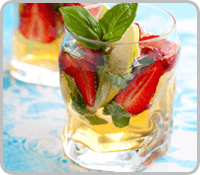Staying Hydrated
- Category: Living Well
- Posted On:
- Written By: Monica Taylor, MS, RD, LDN
Stay Hydrated to Beat the Heat
During the summer months in New Orleans, as the heat and humidity kicks into high gear, we all can be left feeling a little drained. It can be a challenge just to walk out the front door some days. Focusing on getting enough fluids can help prevent dehydration and heat-related illnesses. It can be tough to maintain your fluid balance during the sweltering summer months. Here are some tips on how to stay cool and quenched when the mercury rises:
How Much Water Do We Need?
- According to general recommendations from the Institute of Medicine, men should drink at least 13 cups (3 liters) of water a day and women nine cups (2.2 liters).
- Vigorous exercise in hot and humid weather can be challenging and even dangerous. Exercise cautiously by decreasing the intensity or duration of your workout and choosing to do so during the cooler parts of the day (early morning, later in the evening). During outdoor exercise that lasts = 90 minutes, drink additional water before, during and after to maintain hydration. Outdoor exercise that lasts >90 minutes may also require you to replace electrolyte losses with a sports drink.
- Thirst or dry mouth is a good indicator that you need to drink more water. If you’re thirsty, your body is already dehydrated.
- Pay attention to your urine. Pale yellow and clear means that you are well hydrated. If it’s dark, it’s time to drink up!
How to Get It?
- Drink up! Water is the best hydrator. If you prefer a little flavor, try adding a splash of fruit juice or keeping a pitcher of water infused with fruits and herbs.
- Watch it! Alcohol, sugar and caffeine should be limited as they contribute to fluid losses. I know it can be tempting to cool off with frozen summer treat like a daiquiri, frozen coffee or the New Orleans summertime staple- Snowballs, but these drinks can pack a dehydrating doozy and a lot of extra calories.
- Eat up! Certain foods contain water too. Fruits and vegetables contain the highest percentage of water: salad greens, watermelon, grapefruit, cucumbers, summer squash, tomatoes, berries, bell peppers. They all contribute to your fluid intake.
- Set a Timer. If you’re one of those who can never seem to remember to drink during the day, try setting a timer to go off every 20 to 30 minutes and take a drink. Keep a reusable water bottle with you at all times.
- Cool it! Go for a cool beverage instead of the coldest beverage you can find. It will be easier for your body to absorb, and less likely to give you a stomach cramp.
Other Pointers
- Wear light, loose fitting clothing to allow air to circulate around you.
- Try to avoid direct sun exposure. Find the shade, and protect yourself by wearing a hat, sunglasses and sunscreen.
- Hungry? Drink a glass of water. The mind often confuses the feeling of thirst for hunger.
Hydrating Recipes:
 Strawberry-Lemon Basil Infused Water
Strawberry-Lemon Basil Infused Water
Ingredients:
4-6 strawberries, hulled and quartered
½ lemon, sliced
Small handful of basil, muddled
Directions: Fill a pitcher with the above ingredients. Cover with cold filtered or sparkling water. Place in fridge and let the flavors infuse for at least an hour.
Watermelon, Tomato, and Mint Salad
Ingredients:
1 (4-4.5 lb) watermelon, cubed
3 large Creole tomatoes, seeded and cubed
1 medium sweet onion, thinly sliced
4 Tbsp chopped fresh mint
1 cup crumbled feta
Directions: Mix the above ingredients together in a large bowl. Cover and chill. Drizzle with extra virgin olive oil before serving. If desired, season with salt and pepper. Substitutions: Goat cheese for feta, basil for mint, splash of lime juice.
Monica Taylor, MS, RD, LDN is a Clinical Dietitian at Touro Infirmary. She received her Bachelor of Science in Dietetics from University of Louisiana at Lafayette. She also received her Masters of Science in Nutrition from Texas Woman’s University. She has experience in medical nutrition therapy, clinical nutrition, nutrition education and nutritional counseling.


